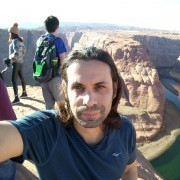Peer-reviewed
Carlo MA, Riddell EA, Levy O, and Sears MW (2018) Recurrent sub-lethal warming decreases embryo survival, inhibits development, and alters species range projections under climate change. Ecology Letters, 21: 104-116.
Levy O, Borchert† J, Rusch T, Buckley LB, and Angilletta MJ (2017) Diminishing returns reduce energetic costs of climate change. Ecology, 98: 1217–1228.
Basson CH, Levy O, Angilletta MJ, and Clusella-Trullas S (2017) Lizards paid a greater opportunity cost to thermoregulate in a less heterogeneous environment. Functional Ecology, 31: 856–865.
Telemeco RS, Fletcher B, Levy O, Riley A, Rodriguez-Sanchez Y, Smith CD, Teague C, Waters A, Angilletta MJ, and Buckley LB (2017) Lizards fail to plastically adjust nesting behavior or thermal tolerance as needed to buffer populations from climate change. Global Change Biology, 23: 1075–1084.
Levy O, Dayan T, Porter WP, and Kronfeld-Schor N (2016) Foraging activity pattern is shaped by water loss rates in a diurnal desert rodent. The American Naturalist, 188(2): 205-218.
Levy O, Buckley LB, Keitt TH, and Angilletta MJ (2016) A dynamically downscaled projection of past and future microclimates. Ecology, 97(7): 1888.
Levy O, Buckley LB, Keitt TH, and Angilletta MJ (2016) Ontogeny constrains phenology: opportunities for activity and reproduction interact to dictate potential phenologies in a changing climate. Ecology Letters, 19(6): 620-628.
Levy O, Buckley LB, Keitt TH, Smith CD*, Boateng KO*, Kumar DS*, and Angilletta MJ (2015) Resolving the life cycle alters expected impacts of climate change. Proceedings of the Royal Society B, 282: 2813. *undergraduate mentee
Levy O, Ball† BA, Bond-Lamberty B, Cheruvelil KS, Finley AO, Lottig N, Punyasena S, Xiao J, Zhou J, Buckley LB, Filstrup CT, Kiett TH, Kellner JR, Knapp AK, Richardson AD, Tcheng D, Toomey M, Vargas R, Voordeckers JW, Wagner T, and Williams JW (2014) Approaches to advance scientific understanding of macrosystems. Frontiers in Ecology and the Environment, 12(1): 15-23. †first author contribution.
Levy O, Dayan T, Rotics S, and Kronfeld-Schor N (2012) Foraging sequence, energy intake, and torpor: An individual-based field study of energy balancing in desert golden spiny mice. Ecology Letters, 5(11):1240-1248.
Levy O, Dayan T, Kronfeld-Schor N, and Porter WP (2012) Biophysical modeling of the temporal niche: from first principles to the evolution of activity patterns. The American Naturalist, 179(6): 794-804.
Gutman† R, Dayan T, Levy O (†first author contribution), Schubert† I, and Kronfeld-Schor N (2011) The effect of the lunar cycle on stress hormone levels and foraging ecology of nocturnally and diurnally active spiny mice. PLoS ONE, 6(8): e23446.
Levy O, Dayan T, and Kronfeld-Schor N (2011) Interspecific competition and torpor in golden spiny mice: Two sides of the energy acquisition coin. Integrative and Comparative Biology, 51(3): 441-448.
Levy O, Dayan T, and Kronfeld-Schor N (2011) Adaptive thermoregulation in golden spiny mice: The influence of season and food availability on body temperature. Physiological and Biochemical Zoology, 84(2): 175-184.
Rotics S, Dayan T, Levy O, and Kronfeld-Schor N (2011) Light masking in the field: an experiment with nocturnal and diurnal spiny mouse species under semi-natural field conditions. Chronobiology International, 28(1): 70-75.
Levy O, Dayan T, and Kronfeld-Schor N (2007) The relationship between the golden spiny mouse circadian system and its diurnal activity: an experimental field enclosures and laboratory study. Chronobiology International, 24(4): 599-613.


